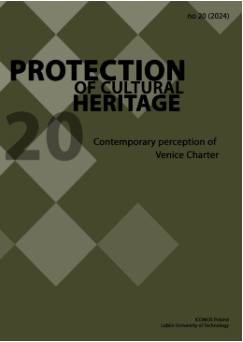Letting Go: the Limits of Intervention
Grzegorz Bukal
grzegorz.bukal@pg.edu.plFaculty of Architecture, Gdansk University of Technology (Poland)
Abstract
The purpose of this paper is to draw attention to the issue of the final limit of conservation interventions towards architectural monuments in the context of a holistic concept of heritage protection. The full text is addressed to Polish readers due to its special reference to the situation in the Polish system of protection of architectural heritage.
Although architecture belongs to the sphere of applied arts, most of the buildings were not created as works of art. Their raison d'être was - and still is - the possibility of implementing technical tasks in a manner strictly meeting the users' expectations. They were mostly subordinated to the principles of technology and economy. Their life cycle assumed even aesthetically degrading transformations, wear and tear as well as planned or unplanned end. The end of existence of an ordinary building is as natural as the pursuit of an eternal preservation of a (traditionally understood) work of art in its original condition. And such an end should be perceived as natural, and in some circumstances acceptable, even from conservation point of view. By adopting the concept of overwhelming “heritage” uncritically, Polish law allows it possible to extend protection to every building from undefined “past era”, regardless of its condition, without a question of the technical feasibility of the intervention. In the absence of an objective assessment system, this led to a huge increase in the number of buildings entered in the list of monuments and to the ineffectiveness of the formal protection. It has also worsened the ability to protect still existing and very neglected objects of real monumental values.
Keywords:
architectural monument, conservation, conservatory interventionsReferences
Bukal G., Produkcja zabytków jako problem konserwatorski (przykład Gdańska) [w:] Współczesne problemy teorii konserwatorskiej w Polsce, red. B. Szmygin, PKN ICOMOS, Warszawa 2008, s. 17-24;
Google Scholar
Bukal G., Ochrona i zagrożenie wartości zabytków – czyli o skutkach braku wartościowania i co dalej… [w:] Wartościowanie zabytków architektury red. B. Szmygin, PKN ICOMOS, Warszawa 2013, s. 61-70.
Google Scholar
Convention Concerning the Protection of the World Cultural and Natural Heritage, https://whc.unesco.org/en/conventiontext.
Google Scholar
Decyzja Pomorskiego Wojewódzkiego Konserwatora Zabytków w sprawie wpisania do rejestru zabytków z dn. 07.01.2020, PWKZ. 5140.5.2017. (AK) PŚ, s. 10.
Google Scholar
https://sip.lex.pl/orzeczenia-i-pisma-urzedowe/orzeczenia-sadow/ii-osk-896-16-skreslenie-z-rejestru-zabytkow-wyrok-522558022.
Google Scholar
https://www.nid.pl/pl/Informacje_ogolne/Zabytki_w_Polsce/Ewidencja_zabytkow.
Google Scholar
Orchowska-Smolińska A., Woźniakowski A., Ekspertyza określająca dopuszczalny zakres ingerencji inwestycyjnej na terenie zespołu zabytkowego dawnej Stoczni Gdańskiej w Gdańsku w kontekście zachowania krajobrazu kulturowego oraz ochrony wartości dziedzictwa materialnego i niematerialnego tego obszaru, miejsca proponowanego do wpisu na Listę Światowego Dziedzictwa. Gdańsk 2019.
Google Scholar
Przyłęcki M., Ekspertyza zabytkowego pałacu w Głębowicach w woj. wrocławskim. Wrocław, 1996.
Google Scholar
Raport o stanie zachowania zabytków nieruchomych w Polsce. Zabytki wpisane do rejestru zabytków (księgi rejestru A i C). Narodowy Instytut Dziedzictwa, Warszawa 2017.
Google Scholar
Ustawa z dnia 23 lipca 2003 r. o ochronie zabytków i opiece nad zabytkami Dz. U. z 2021 r. poz. 710, 954, Art. 6. 1.
Google Scholar
Zybała T., Analysis of the state of preservation the historic arcaded houses in Vistula Delta listed in the National Inventory of Historical Monuments, Budownictwo i Architektura, 2021, w druku.
DOI: https://doi.org/10.35784/bud-arch.2345
Google Scholar
Authors
Grzegorz Bukalgrzegorz.bukal@pg.edu.pl
Faculty of Architecture, Gdansk University of Technology Poland
Statistics
Abstract views: 178PDF downloads: 159
License

This work is licensed under a Creative Commons Attribution-ShareAlike 4.0 International License.








